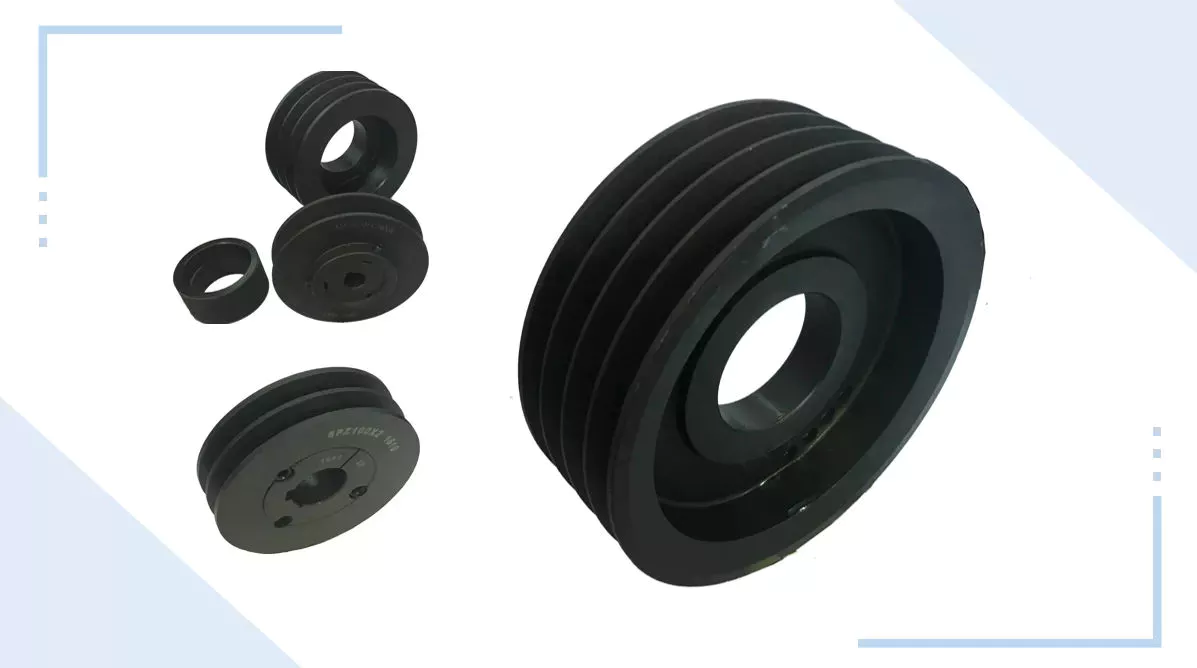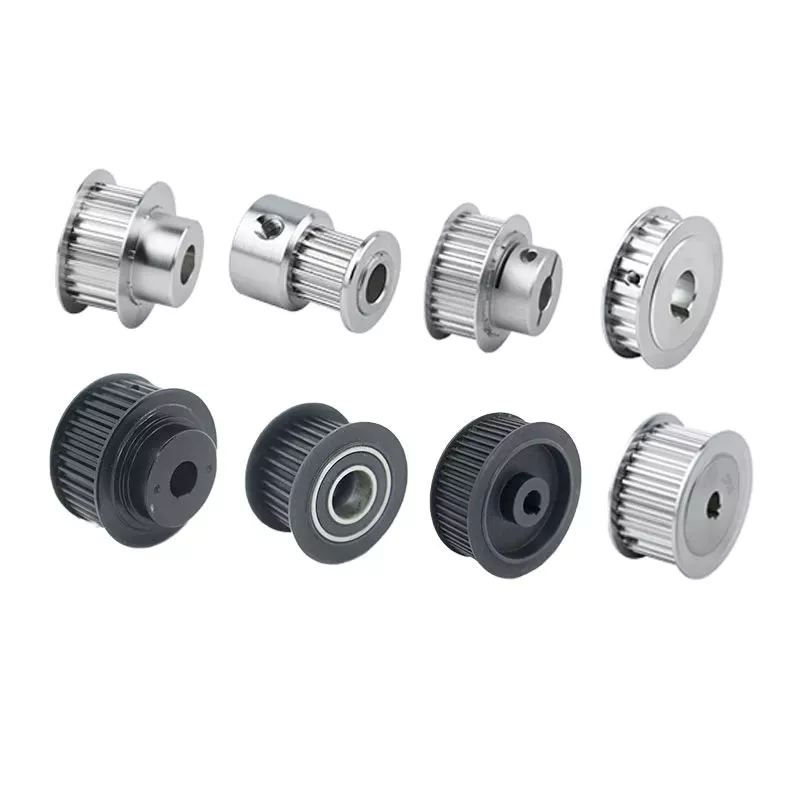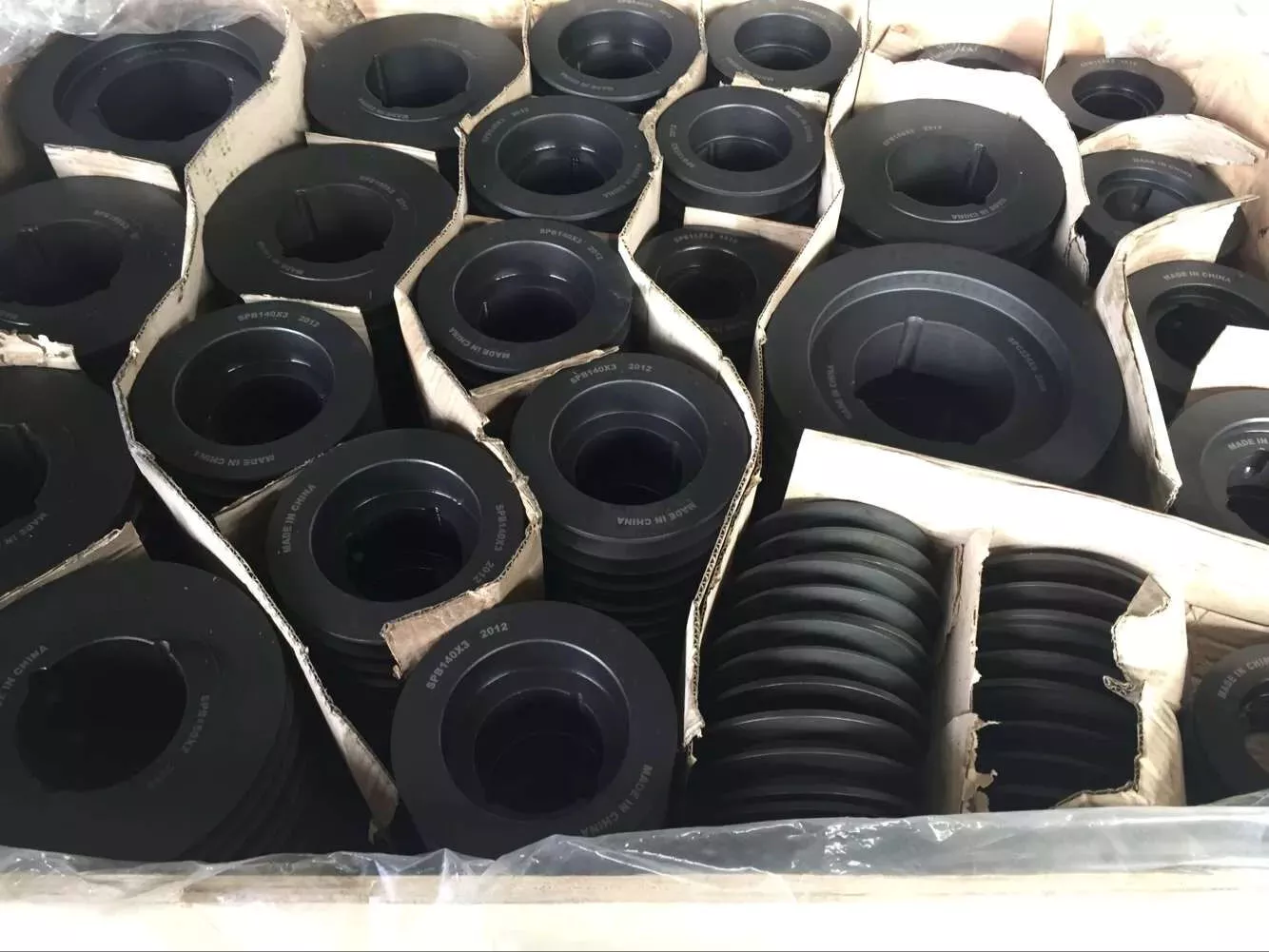Product Description
Spare Parts Casting Sheave Pulley for Large Mining Lifting Machinery
Product Introduction:
Xihu (West Lake) Dis. wheel device can transport the whole under the premise of swimming round and fixed wheel adopts integral cast joint structure, wheel hub, wheel rim for cast steel materials, spoke for the channel steel, after welding the whole annealing process again.
Considering the replacement bearing maintenance convenient, leave replace bearing remove space, CZPT wheel device structure adopted eccentric layout.
Xihu (West Lake) Dis. shaft using middle carbon alloy steel forging whole, adopting the structure of the cast joint pulley, equipped with PVC or nylon liner, protect the wire rope.
Imported or domestic spherical roller bearings, also can install bearing temperature measuring element.
In order to prolong the service life of wire rope, rim inside wedge liner with wear-resisting, withstand voltage, using D660 (1571) or nylon liner.
1) eccentric layout: on 1 side of a winding wheel have replaced bearing dismantling space, can not remove the pulley mechanism, only for bearing maintenance and replacement.
2) symmetry layout: relative with 4 wheels on both sides of the 2 bearing seat is symmetrical, but need to replace the bearing shell, only to remove the pulley mechanism.
sheave pulley and the common malfunction and technical CZPT wheel
1) to the problem of old structure pulley sliding bearing to burn tile should improve lubrication way; Because of the pulley is installed on the derrick, daily maintenance inconvenience, should add temperature alarm device, so as to timely maintenance to prevent the tile burning failure, or the original sliding bearing replacement into rolling bearing structure
2) for old structure pulley rope groove without liner, can no longer add padding on the original rope groove, need to change a gasketed pulley, adjacent assembly size can remain motionless, and installation
3) for mountain transportation difficulties or have some difficulties in roadway transportation in underground mine, the pulley is (guide wheel) change the structure into 2 or 4 and a half of head sheave.
Mine hoist sheave specification:
| Material | Q235B,Q345B,35#,45# |
| Heat treatment | Hardening and tempering, high frequency quenching, carburizing quenching and so on |
| Groove surface quench | HRC45-55 |
| Groove surface quench depth | ≥2mm |
| Processing diameter scope | 1600~5000mm |
Our services:
1>.Pre-sale services: enthusiasm
We provide you with the prophase plan, process flow design and manufacturer equipment according to your special demand.
2>.Sale services: servant
Send technicians to the jobsite for guiding the installation and adjustment, training operators and finishing the check and accept together with you.
3>.After-sale services: faithfulness
To establish long term friendship, we will regularly pay return visit to customers.
Supplying technique, building design, instruction, installation and debugging for free.
4>.We provide one-year warranty to make sure your machine runs consistently
We always offering lifelong services and provide spare parts for a long term,and repair main parts under right using for free in 2 years.
About us
CITICHL is national major industry and heavy machinery manufacturing base in the middle of china, we can supply the customers with important complete technical equipments in mining, non-ferrous metal, chemical industry, metallurgy, construction materials, environment protection, and power generating as well as other basic industries. Our products are sold well to countries and regions in Asia, Africa, Europe, and Australia, and hold a large market share home and abroad.
We also supply all kinds of crushing equipments, vibrating feeder, vibrating screen, rod mil, CZPT washer, belt conveyor, screw classifier, flotation machine, magnetic ore separator, shaving table, spiral chute, rotary kiln, rotary dryer, mine hoist , ect. If you have any interest in our products, pls kindly contact us by the upper information with no hesitation.
Types of pulleys and their advantages and disadvantages
There are several types of pulleys. Learn the basic equations of the pulley system. Then learn about the different uses for pulleys. The disadvantages of using pulleys will be covered. Knowing these, you can buy the pulley that suits your needs. Here are some of the best pulley types and their pros and cons.
Basic equations of pulley systems
A pulley system is a mechanism that allows 2 blocks of a certain mass to be connected by a taut rope. The acceleration of each block is the same in magnitude and direction. The external force acting on each block is the weight of the block (10g) and the tension in the string. The tension between the 2 blocks is the total tension and the force acting on the pulley is the weight of the 2 blocks.
This simple mechanism uses 2 simple equations to explain how the system works. First, the mass of the weight on both sides of the pulley must be the same. When the weight is forced to move, the rope tightens and the second pulley descends. The weight is also attached to the second pulley and must be the same distance as the first pulley. This will result in a speed ratio of 2 times the distance covered by the first pulley.
Second, we have to calculate the force required to lift the object. The lower mass is supported by a wire configuration passing through all pulleys, while the uppermost pulley is used to apply the force. The lower block is used to support the weight. The applied force needs to travel a distance nx to move the weight. This distance, called MA, can be written as:
Once we have gathered the necessary information, we can apply the calculations to the pulley system. We can also use the Mechanical Advantage Calculator to calculate the force on the anchor. To do this, we must apply a force to the load as well as to the pulley itself. Using this equation, we can calculate the force required by the load to lift the load.
Types of pulleys
There are 3 basic types of pulleys: movable, fixed and compound. Both types of pulleys translate the force applied to them. The ideal mechanical advantage of pulleys is two. This is because a single movable pulley only doubles the force, whereas a compound pulley doubles or triples the force. This type of pulley is often used with other types of pulleys.
Movable pulls move with the weight of the load, and the force pulling them increases on the lift side. They are often found in utility elevators and construction cranes. These systems are very simple, inexpensive and quiet to use. The force required to lift the object depends on the mechanical advantage of the system. The 2 most common types of pulleys are listed below. Let’s take a closer look at each one.
V-shaped pulleys are used in vehicles and electric motors. These pulleys require a “V” belt to function properly. Some have multiple “V” grooves to avoid slipping. They are used in heavy duty applications to reduce the risk of power slip. These pulleys also have more than 1 “V” groove. V-belt pulleys are commonly used in vehicles and electric motors.
Composite pulleys are made from more than 1 type of cable or rope wrapped around the wheel. They can be fixed or hinged and are usually made of stainless steel or bronze. Composite pulleys have multiple layers and can be a single unit or many different components. There are 3 main types of pulleys: fixed pulleys and composite pulleys. These are the most common types. Almost every type of pulley is used for some type of application.
Fixed pulleys have 1 advantage over movable pulleys: they change direction as the weight of the load increases. They are typically used in heavy construction equipment. Gun tackles, patio tackles, and stationary tackles are examples of equipment that use a pulley mechanism. These devices are very common and can be found on most modern construction sites. They provide great convenience for lifting large loads.
application
What are the applications of pulleys? Simply put, a pulley is a mechanical device that transforms a difficult task into an easier one. It consists of ropes and pulleys. It is usually used to lift objects. Usually, people wrap a rope around a pulley and pull up to lift the object. One disadvantage of using pulleys is that they require the same force as lifting the object directly.
One of the most popular applications of pulleys is lifting heavy objects. They help people pull up heavy objects and blocks. The system can also be used in seeders, lifts, grinders, etc. Other applications include raising flags, loading cargo, pulling curtains and rock or mountain climbing. Students can learn about the various uses of pulleys and the physics behind them.
Pulleys can be made of many different materials, depending on the application. Some are movable, which means they move with the object they are used to lift. This pulley system can be made of nylon, wire rope or fiber material. The best part about these systems is that they are easy to install and maintain. For a better grasp, use the guide or video tutorial to learn more about the pulley system and how it works.
Tapered pulleys are common in paper mills. They are high-quality pulleys that transmit power to connected parts. They can be dynamic or static and have different balances. Because pulley systems are highly customized, most industrial applications require systems designed specifically for specific applications. In this way, the system is safe, simple and inexpensive. The benefits of this design are endless.
The most common use of pulleys is for motor drives. They are used to minimize noise by applying force to the shaft to reduce the workload. They are also less expensive than gears and do not require lubrication. Furthermore, they can change the direction of the applied force. They are also less expensive than gears and are often used with other components. A screw is a cylindrical member with helical ribs used to connect something.
shortcoming
Although the pulley system makes it easier to move heavy objects, it still has some drawbacks. When using a pulley system, you must remember that the force required to lift the weight increases with the number of cycles. In addition, the distance between the puller and the heavy object increases, which may lead to accidents. Also, moving heavy objects can be tricky if the rope slips. Pulley systems are not very expensive and can be easily assembled. However, it does require a lot of space.
First, it is not efficient. Besides being inefficient, pulleys produce different forces at different speeds. Fixed pulleys use more force than the load, while movable pulleys move with the load. A movable pulley requires less force than a fixed pulley, but the combined system travels a long distance. Therefore, this method is not as efficient as the fixed method.
Pulleys are not only used in industrial processes. You can see them in various places in your daily life. For example, large construction cranes use pulleys to lift heavy loads. Even flagpoles, blinds, clotheslines, ziplines, motors and climbing equipment use pulleys. Still, despite their advantages, the disadvantages are not too serious.
Another disadvantage of the pulley is its wear and tear. While a pulley’s housing is theoretically infinite, its bearings and locking components typically wear out over time. To overcome this problem, a new bearing and locking assembly can be installed. No need to replace the housing and shaft, the entire assembly can be re-bonded and painted to replicate the original look. Alternatively, the pulley can be replaced with a new housing and shaft.
Using pulleys can also reduce the advantage of pulleys. On the other hand, interception and tackle is a system in which 2 pulleys are connected to each other using ropes. Unlike pulleys, pulley pulley systems can be adjusted in the direction of travel and can move heavy loads up to 4 times their force when used in hydraulic lifts.

